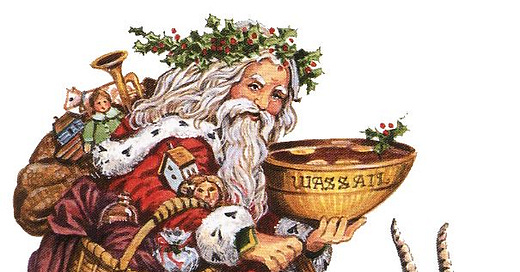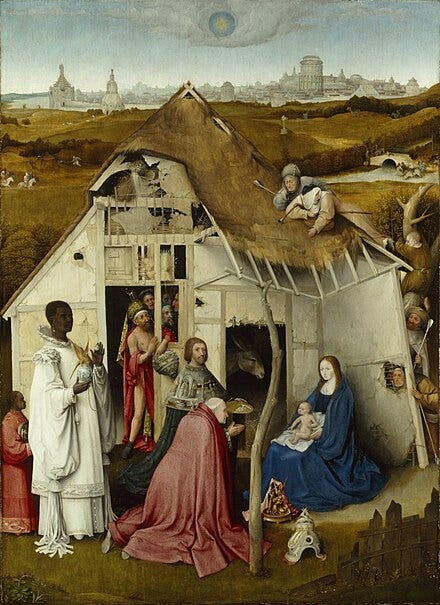I was brought up in a fairly pagan household where the ruling deity of December 25th was not Jesus Christ but Father Christmas.
We didn’t go to church on that day – I mean as if there was time to do so, with turkey to be cooked, Brussel Sprouts to be prepared and the Christmas Pudding put on to steam.
My brother and I had ransacked our stockings, bizarrely they were mesh ones which must have presumably once held Cadbury’s chocolates or similar, my mum was an early exponent of recycling. Our stockings were always similar. There was always a tangerine, a blowy thing I never knew the name of – still don’t, some little toy or puzzle and chocolate coins. How I loved those. I felt like a millionaire.
We would then have a speedy breakfast and start to open our Christmas Presents.
Of course, this is a part of the day which attracts different traditions in different families. Some people wait until after lunch, some even watch each person unwrap their gift before another person gets their chance. Not my family. We had no wish to defer our gratification. As I said, Father Christmas was our ruling deity. We started on ours straight after breakfast.
But, as we all know from sad experience, Christmas Day is over all too soon. There then comes that vapid time of irritation and ennui, when the books have been read, the records played so often that they drive others mad, the season of love is replaced by that of loathing.
New Year’s Eve is beloved by many – but not by me. Check out my previous post if you’d like to find why.
And that’s more or less the end of the season. Except. Except that within a week comes Twelfth Night.
This is a complicated feast. It has this title because it’s the twelfth day of Christmas although there is huge disagreement about when the twelve days actually start. Some say it’s Christmas Eve, others it's Christmas Day. Count from Christmas Eve and Twelfth Night is on the 5th January, from the Christmas Day and it’s the 6th. Calendars have more holes in them than colanders.
The only Twelfth Night tradition we abided by was the necessity of taking down Christmas decorations on that day. Fail to do so and terrible things would happen to you. We forgot one year and had the best year of our lives. So much for superstition.
But what does Twelfth Night commemorate? And why did Shakespeare name a play after it?
It’s all tied up with the Epiphany. You know the day when the three kings came to see the baby Jesus bringing him gifts of Gold (Chocolate coins in golden paper), Frankenstein and Mirth. Or something like that.
The visitors started out as Persian sages or magi but as time went on, being a sage was not considered good enough. They became kings and acquired names: Caspar, Melchior and Balthasar. Even more intriguingly, Balthasar was increasingly depicted as black. When he wrote in the early eighth century, the great scholar Bede suggested this was the case but most depictions of Balthasar as black are much later, probably reflecting the fact that Europeans would have seen Africans while trading. Or that they may have been brought here as slaves.
Other countries make more of it. Here in France local bakers produce cakes called Galette des Rois, cake of the Kings, and children are often given paper crown to wear. In the past the cakes were baked with a bean and whoever found it became King or Queen of the festivities.
A British tradition was to drink Wassail, a drink of mulled wine or warm beer and go Wassailing, which means careering around the village, knocking on doors to wish people a healthy new year. In the cider making shires of the West Country Wassailing involves going around local apples to bless the trees. While also having a drinkie or two.
And now, to the most important thing about Twelfth Night for me. It plays a huge role in the history of England.
It is 878 and the country is hunkering down in one of the fierce winters of that period. The people of Wessex would have been pleased at the inclement weather, however, Alfred the king, even more so. This was because it would guarantee some respite from the depredations of the Vikings. And depredate they did. Over ten years they had conquered every English kingdom except for Wessex. No army would go to war in such conditions. Right? Wrong.
Guthrum, the king of the Vikings, had decided to attack Wessex when Alfred and his nobles were enjoying themselves: feasting, drinking and watching entertainers. Guthrum was not a king any Christian wanted as a visitor. And he wasn’t bearing gifts. His men erupted into the town of Chippenham and caught Alfred and his warriors completely off-guard. It may be that there was a spot of treachery involved.
It was a massacre. Most of Alfred’s men died in the battle and with his family and a few of his companions, he just managed to escape with their lives. He was a fugitive, with no army, no treasure and no friends. The Vikings were triumphant. They had conquered Northumbria, East Anglia, Mercia and now, finally Wessex. England was no more.
So why don’t we speak Danish? That’s because Alfred was not the sort of man to give up.
This extract is from the finale of my forthcoming novel The War on Wessex.
It was a perilous crossing. The stepping stones were as treacherous and Leif only kept his footing because Thorvald had firm hold of him. But they made it across without slipping and moved to the right so that the rest of the men could follow.
‘This will take an age,’ Kolga said as she hunkered down beside them. ‘How deep is the river?’
‘It would come up to our necks,’ Leif said. ‘Better to go slowly than have our boys drown.’
‘And it’s icy cold,’ Thorvald said. As soon as he said it they heard a splash as one of the warriors lurched into the water. He struggled to grab the rock but failed and was swept away by the current. He wailed in despair and disappeared from view.
‘I hope the Saxons didn’t hear that,’ Kolga said. ‘The bastard should have kept his mouth shut.’
‘The gentle heart of a woman,’ Leif said.
Kolga gave him a chill smile. ‘You know I have no heart, Leif. Or if I do, it’s hard as flint and black as pitch.’
Guthrum joined them, glancing up at the walls of the town. ‘We can’t wait until all the lads are across. The longer we linger the more likely we’ll be spotted.’ He glanced back at the river. About a third of the army had made the crossing.
‘It will be dusk soon,’ Asgrim said.
‘Then even more reason to move now,’ Guthrum said. ‘The townsfolk will light lamps and the snow will no longer hide us.’ He nudged Leif. ‘Come on, my friend, let’s put an end to Wessex.’
They silently crept up to the wall. Leif glanced up at the top, fearing to see sentries there. But there was no sign of them. He wondered if they had been paid off by Wulfhere or merely thought that there was no chance of an attack in such vile weather.
‘Let’s go,’ Guthrum said. He led the way forward, accompanied by his bravest warriors and closely followed by Leif and his friends. They halted at the gate and hearkened to the sound of merriment from the town. Then Guthrum stood up and thrust his hands against the gate.
It opened easily, gliding quietly in the snow. Opened wide to reveal the town which, apart from a very few lamps, was growing darker by the moment.
The gate had made no noise and now the Viking host poured through in utter silence. Guthrum strode to the front and putting his finger to his mouth, slowly eased his sword from its scabbard. A thousand others followed, spears were lifted and axes hefted. And then he pointed to Wulfhere’s hall and began to lope towards it. The army followed swiftly, silent as wolves intent on getting close to their prey without being spotted. Yet they were seen by the sentries who did not react, merely stared at them.
‘Wulfhere has bought their silence,’ Leif said.
‘No matter,’ said Guthrum, hurling a throwing axe deep into the chest of one of the sentries. One of his warriors skewered the second man with a spear.
‘Let’s spoil their celebration,’ Guthrum cried and threw open the door to the hall.
They were blinded by the lights for a moment. But they soon saw that the hall was crowded with townsfolk, squeezing next to one another at the feast table, raising cups of ale to one another, gorging on the final feast of the season, laughing and gossipping.
Then the sudden cold from outside alerted those nearest the door and they turned in horror to see the warriors pushing in. A dozen people died instantly under a hail of axes and spears. And then the Vikings leapt upon the table, swinging their blades with deadly ferocity.
For a moment there was no sound from those who had been feasting. And then one woman screamed and the floodgates opened. Cries of fear and agony rose to the roof, the sound of women sobbing sweeping everywhere.
Some of the men reacted speedily, grabbing what they could to try to protect their loved ones. All they had were knives and cups while the Vikings had honed blades of death which hacked and slew with ferocity. Their song of triumph vied with the cries of terror from the Saxons.
Those at the back of the hall were thrusting through a second door but it soon became clogged and few managed to escape.
In a short time, the hall was full of dead and dying and some of the Vikings grabbed food and wine from the board.
‘There’s no time for that,’ bellowed Guthrum. He grabbed Leif. ‘Where’s Alfred?’
Leif shook his head. He could seen no sign of him.
‘Warned by Snake-tongue,’ Oscetel cried, pointing his sword threateningly.
Kolga grabbed a wounded man by the hair. ‘Where is the king?’ she demanded.
He pointed a shaking finger. And they saw him. He was battling by the rear door, trying to keep it clear for people to escape. But it was impossible, there were too many foes.
Leif saw Edgwulf push the king through the door. The rest of Alfred’s guards slammed it behind them and prepared to battle to the death.






I relate to your Christmas. Only we were even more impatient and opened gifts before breakfast!
And 12th Night? Golly, my tree and decorations are packed away on Boxing Day! I'm so done with Christmas by then.
I liked what I was reading of the Wessex novel, Martin. Congrats.